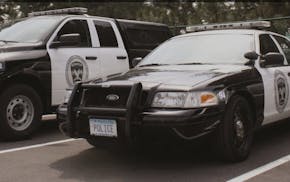Republican Aaron Paul is challenging the results of the House District 54A race, alleging in a notice of an election contest that Scott County elections officials engaged in "deliberate, serious, and material violations" of state election law when they lost 21 ballots yet declared DFL Rep. Brad Tabke the winner by a 14-vote margin.
"Scott County election officials unlawfully lost and failed to count significantly more ballots than would be needed to change the announced result of the election, meaning at the very least the actual victor is in absolute doubt and at worst the candidate who received fewer votes has been announced as the winner," reads the notice, which a Republican public affairs director shared with the Minnesota Star Tribune and other media outlets Monday.
Paul is asking the court to declare a vacancy for Tabke's seat once his current term ends, giving voters the chance to decide a winner "pursuant to Minnesota law governing special elections."
David Zoll, Tabke's attorney, declined to say what next steps he will take on his client's behalf, though Tabke now has seven days to respond to the notice, per Minnesota statute. Paul is represented by Reid LeBeau, an attorney who specializes in campaign finance and election law.
The notice is the latest twist in the Shakopee-area race that will determine the distribution of power in the Minnesota House. DFLers and Republicans will share power for the first time since 1979 if Tabke prevails; if Paul ultimately wins, Republicans will have a slim one-vote majority.
The race has been tightly contested since Election Day, when Tabke appeared to have a 13-vote lead over Paul.
Early returns showed Paul, a Bloomington police officer, ahead in several precincts by small margins. Tabke, a former Shakopee mayor who has served two nonconsecutive House terms, maintained advantages in northeast Shakopee and a precinct north of Shakopee High School.
A few days after election night, Scott County officials rescanned some ballots cast in Shakopee after a scanning machine malfunction. The updated unofficial results increased Tabke's advantage to 14.
Paul then requested a recount, with the margin between the two contenders remaining within the threshold set by state law for a taxpayer-funded recount. Tabke led Paul by 14 votes after the Scott County canvassing board convened Nov. 25 to certify the recount's results.
But looming over the procedures were 21 ballots for which officials couldn't account. County officials launched an investigation into the whereabouts of 20 missing ballots cast in Shakopee's 10th precinct. They opted not to pursue a singular missing ballot from precinct 12A after noting it's not uncommon for one voter to check in and not vote.
The results of the preliminary investigation released Nov. 27 found those 20 missing ballots were likely thrown away before being tabulated, a situation Scott County Attorney Ron Hocevar attributed to "human error."
Hocevar said Monday that the investigation is ongoing. He added that county will continue to provide updates about the situation, though he couldn't provide a timeline for the next information release.
The House 54A race is one of two that went to a recount as DFLers and Republicans vied for control of the Minnesota House. On Monday, the Associated Press called the other outstanding race, District 14B in the St. Cloud area, for DFL Rep. Dan Wolgamott.
Yet the Shakopee-area contest continues. In the notice, Paul has asked Scott County District Court to set a hearing within 15 days, which would allow both parties to present evidence about the protracted election and missing-ballot episode.
Paul is also asking the court to prohibit the Scott County Auditor and Secretary of State from certifying the election in Tabke's favor, declare the District 54A House race invalid and determine a vacancy exists, and recommend the House refuse to seat Tabke.
If Tabke appeals the District Court's decision, the matter would go directly to the Minnesota Supreme Court. Court decisions would then be forwarded to the Minnesota House for a legislative hearing, according to state statute.

Four arrested, no one injured in fighting and shooting following Burnsville High School graduation

One man dead in shooting Friday outside Northtown Mall in Blaine

University of Minnesota is putting its golf course up for sale
Supreme Court allows DOGE team to access Social Security systems with data on millions of Americans

